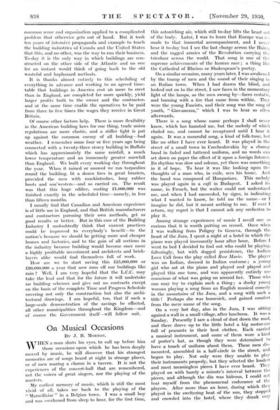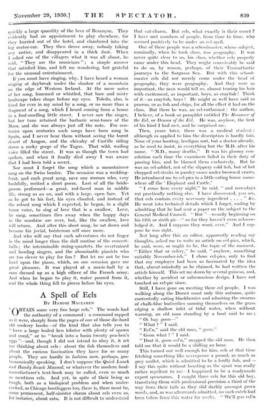On Musical Occasions
BY J. B. MORTON.
WHEN a man shuts his eyes, to call up before him those occasions upon which he has been deeply moved by music, he will discover that his strongest memories are of songs heard at night in strange places, or of men roaring a chorus in a tavern. It is not the experiences of the concert-hall that are remembered, not the voices of great singers, nor the playing of the masters.
My earliest memory of music, which is still the most vivid of all, takes me back to the playing of the " Marseillaise " in a Belgian town. I was a small boy and was awakened from sleep to hear, for the first time,
this astonishing air, which still to-day lifts the heart out of the body. Later, I was to leans that Europe was made to that immortal accompaniment, and I neve: hear it to-day but I see the last charge across the Haim, and the ragged armies of the Revolution carrying th-2 tricolour across the world. That song is one of tha supreme achievements of the human race ; a thing like the Cathedral of Rheims or Shakespeare's poetry.
On a similar occasion, many years later, I was awakened by the tramp of men and the sound of their singing in an Italian town. When I had drawn the blind, and looked out on to the street, I saw faces in the momentary light of the lamps, as the men swung by—faces ecstatic, and burning with a fire that came from within. They were the young Fascists, and their song was the song of youth, " Giovanezza," which I was to hear so often afterwards.
There is a song whose name perhaps I shall never
know, which has haunted me, but the melody of which eluded me, and cannot be recaptured until I hear it again. It was a mournful song, a kind of folk-tune, but like no other I have ever heard. It was played in the street of a small town in Czechoslovakia by a clumsy band in faded and tattered uniform, and no words can set down on paper the effect of it upon a foreign listener. Its rhythm was slow and solemn, yet there was something in it of hope. To hear it was like looking upon tha thoughts of a man who, in exile, sees his home. And the band was composed of Hungarians. This melody was played again in a eafi in Budapest. I asked its name, in French, but the waiter could not understand me, and when I had succeeded, by signs, in indicating what I wanted to know, he told me the name—or I imagine he did, but it meant nothing to me. If ever I return, my regret is that I cannot ask any orchestra to play it.
Among strange experiences of music I recall one so
curious that it is worth putting on record. Once when I was walking from Poligny to Geneva, through the heart of the Jura, I spent a night at a hotel in which the piano was played incessantly hour after hour. Before I went to bed I decided to find out who could be playing, falteringly, but with .dogged persistence, the Indian Love Call from the play called Rose Marie. The player was an Indian, dressed in Indian costume ; a young girl who sat at the piano and played and played aml played this one tune, and was apparently entirely un- conscious of what was going on around her. T can may try to explain such a thing ; a dusky youngvo‘lsio
uig woman playing a song from an English musical comedy in the mountains of the Jura, and a song with such a title ! Perhaps she was homesick, and gained comfort from the mere name of the song.
On a very hot day, also in the Jura, I was sitting against a wall in a small village, after luncheon. It was a Sunday. Presently I saw a cloud of dust down the road, and there drove up to the little hotel a big motor-ear full of peasants in their best clothes. Each carried a musical instrument, and some of them wore a kind of porter's hat, as though they were determined to have a touch of uniform about them. These men dis- mounted, assembled in a half-circle in the street, and began to play. Not only were they unable to play their instruments properly, but they selected the loudest and most meaningless pieces I have ever heard. They played on with barely a minute's interval between the pieces, and although the din was hideous, I could not tear myself from the phenomenal endurance of the players. After more than an hour, during which they played in the sweltering heat of the sun, they stopped and crowded into the hotel, where they drank very quickly a large quantity of the beer of Besancon. They evidently had an appointment to play elsewhere, for they hurried out of the hotel, and clambered into the big motor-car. They then drove away, nobody taking any notice, and disappeared in a thick dust. When I asked one of the villagers what it was all about, he said, "They are the musicians " ; a simple answer that satisfied him, and left me wondering, but grateful for the unusual entertainment.
If you must have singing, why, I have heard a woman singing at daybreak under the shadow of a mountain on the edge of Western Ireland. At the mere notes of her song, hummed or whistled, that bare and misty landscape takes shape before my eyes. Toledo, also, is fixed for ever in my mind by a song, or no more than a fragment of a song, which I heard coming from a house in a foul-smelling little street. I never saw the singer, but her tune retained the barbaric semi-tones of the Moor, and she was always just off the note. For cen- turies upon centuries such songs have been sung in Spain, and I never hear them without seeing the burnt desert of Aragon, and the chivalry of Castille riding down a rocky gorge of the Tagus. That wild, wailing voice filled the street. It was as though the town had spoken, and when it finally died away I was aware that I had been told a secret.
Nor must I forget the song which a mountaineer sang on the Swiss border. The occasion was a wedding- feast, and eacb guest sang, Save one woman who, very bashfully, recited a short poem. Last of all the bride- groom performed—a great, red-faced man in middle life, strong as an ox, and with a large, open face. Yet as he got to his feet, his eyes clouded, and instead of the robust song which I expected, he began, in a slight tenor voice, to sing of love that is a swallow. Love, he sang, sometimes flies away when the happy days in the sunshine are over, but, like the swallow, love will return. And after this short song, he sat down and became his jovial, boisterous self once more.
And who will say that such adventures do not linger in the mind longer than the dull routine of the concert- halls ; the interminable string-quartets, the overtrained and howling singers, and the abominable pianists who are too clever to play for fun ? But let me not be too hard upon the piano, which, on one occasion gave me great pleasure. It was played at a music-hall by a man dressed up as a high officer of the French army. And when he began to play it, water poured from it, and the whole thing fell to pieces before his eyes.











































 Previous page
Previous page